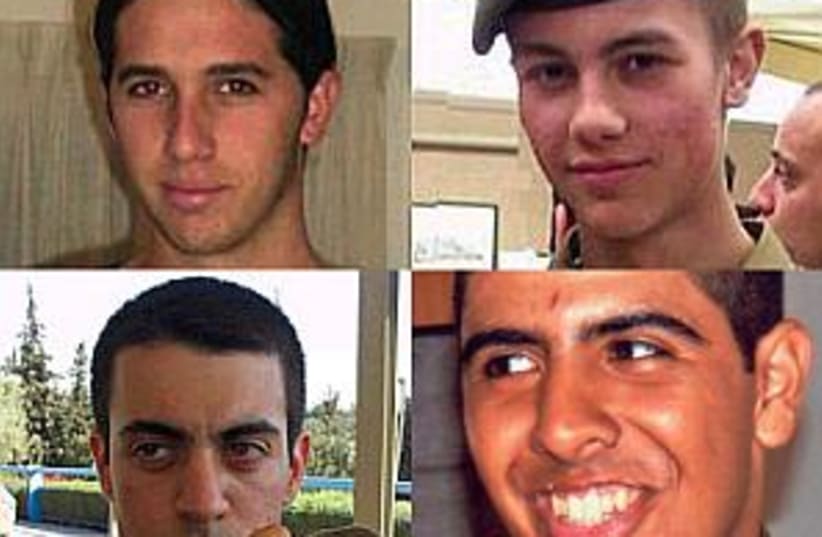The other victims were killed by a Katyusha that landed between Ma'alot-Tarshiha and Moshav Ein Ya'acov. Micha Ma'iki, assistant to Mayor Shlomo Buchbut for Tarshiha affairs, identified them as Sha'anati Assad, 18, and Amir Naim and Mahmud Fa'ur, both 17.
By Friday morning, 47 people who were wounded in the bombardment remained hospitalized at Rambam Hospital in Haifa and in Nahariya Hospital. One was in critical condition, 14 were listed in serious condition, while 32 others were lightly wounded.
Three of the four soldiers were killed at close to noon when an antitank missile hit their tank during a firefight in Rajamin in the western sector. Two died instantly, while the third was mortally wounded. In the course of the battle, the IDF killed 14 Hizbullah gunmen and captured five.
Sgt. Andrei Brodner, 18, from Rishon Lezion, was laid to rest at the military cemetery in the city at 11 a.m. on Friday. Sgt. Itamar Tzur, 19, from Be'er Tuviya, was buried there at 3 p.m. Friday. The third casualty, Sgt. Alon Feintuch from Kiryat Haim, was buried at 12 in Haifa.
The IDF force comprised an armored battalion belonging to the 188th Armored Brigade and the reserve's Alexandroni Brigade.
The fourth soldier, 19-year-old Sgt. Yonathan Sharabi from Petah Tikva, was killed later when Hizbullah operatives fired an anti-tank missile at his unit in the Lebanese town of Ataybeh north of Metulla.
The IDF was pressing forward Thursday night with its ground offensive. Defense Minister Amir Peretz ordered the army to prepare for the second stage of operations, which calls for an advance to the Litani River - 40 kilometers into Lebanon - in a bid to gain control of Katyusha launch sites.
Meanwhile Thursday, Hizbullah leader Shiekh Hassan Nasrallah, for the first time since fighting began 22 days ago, offered to stop rocket attacks on northern Israel in return for an end to airstrikes throughout Lebanon.
"Anytime you decide to stop your campaign against our cities, villages, civilians and infrastructure, we will not fire rockets on any Israeli settlement or city," he said in a taped video statement broadcast on Hizbullah's Al-Manar TV and carried simultaneously on all other Lebanese and Arab satellite channels.
But he also vowed to launch rockets into Tel Aviv if Israeli jets were to strike at Beirut proper. "If you bomb our capital Beirut, we will bomb the capital of your usurping entity... We will bomb Tel Aviv," he said.
Speaking directly to Israelis, Nasrallah said, "The only choice before you is to stop your aggression and turn to negotiations to end this folly."
In the course of the day, seven IDF brigades took up positions in more than 20 villages in southern Lebanon as the army began to carve out a security zone that would be clear of Hizbullah. On Thursday night, OC Ground Forces Maj.-Gen. Benny Gantz said the IDF planned to make the security zone larger than the previously planned depth of 6 to 8 km.
Military sources said that the IDF would create a zone 15 km. deep, a move that would require the insertion of at least one more infantry division into Lebanon.
"We are moving closer to the launch sites," Gantz said during a briefing in Tel Aviv. "We will operate there with more force in an effort to minimize attacks like the ones we experienced this afternoon."
The IDF brigades, comprising at least 10,000 soldiers, were essentially recreating a buffer area similar to the one Israel maintained until it withdrew from Lebanon in 2000. Senior officers said they believed this would be done by the end of the week.
Meanwhile, IDF reservists operating in the western sector killed four Hizbullah gunmen, and destroyed two rocket launchers and an arms warehouse.
IAF jets dropped leaflets over southern Beirut warning residents to evacuate three Shi'ite neighborhoods, a possible prelude to renewed air attacks on the Lebanese capital, security officials said. Israeli jets hit southern Beirut with at least four missiles at about 3 a.m. Thursday, for the first time in more than a week.

